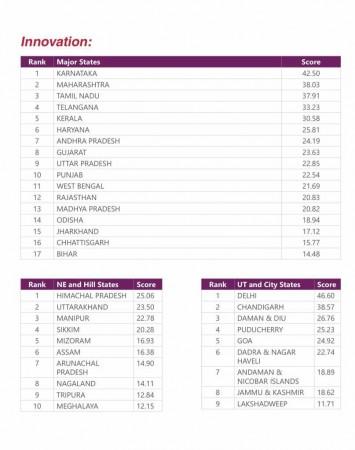Karnataka is crowned as the most innovative among major states in India based on various factors such as human capital, investments, business, legal environment and more. NITI Aayog, the government's policy think-tank, released its second Innovation Index on Wednesday, declaring the top five states in the innovation index.
According to the India Innovation Index Report 2020, released by Vice-Chairman Rajiv Kumar, Delhi topped the overall list and Chandigarh made a huge leap while Karnataka and Himachal Pradesh excelled in respective categories. As per the report, Maharashtra, Tamil Nadu, Telangana and Kerala followed Karnataka's lead in the innovation index.
"There is a very strong corelation between innovation and development. As states become more innovative, their per capita GDP rises," said Amit Kapoor, chairman of Institute for Competitiveness, a Gurugram-based organisation, which worked with NITI Aayog in developing the index.

This is the second time Karnataka has retained the top position in a row. Following the announcement, Karnataka CM BS Yediyurappa took to Twitter to enlighten his followers of the development.
"Amongst major states, the average innovation score is 25.35. Karnataka tops at 42.5, which is attributable to its strong number of venture capital deals, registered GIs (Geographical Indications) and ICT (Information and Communication Technology) exports. Karnataka's high FDI inflow has also enhanced the innovation capabilities of the state," the India Innovation Index 2020 report said.
Meanwhile, Delhi ranked not just higher than other UTs and City States, but outperformed Karnataka as well with a score of 46.60. Karnataka scored 42.50. Similarly, Himachal Pradesh led the charts in NE and hill stations with a score of 25.06.
Below is the full list:

Bolstering India's innovation
Kumar also noted that the agency is working towards attracting Indian talent from abroad. It might even add an indicator in future reports about which states managed to attract a larger number of Indian talent back to the country by making the system flexible, less red tape and an attractive environment. Currently, there are 36 indicators, 32 of which are hard data and the remaining four are composite indicators.
"We will continue to work in very close collaboration with the science and technology teams across all the states as well as the industrial and manufacturing teams across India. We will complement them as the knowledge partner to make India an innovative nation," said Kant.

















